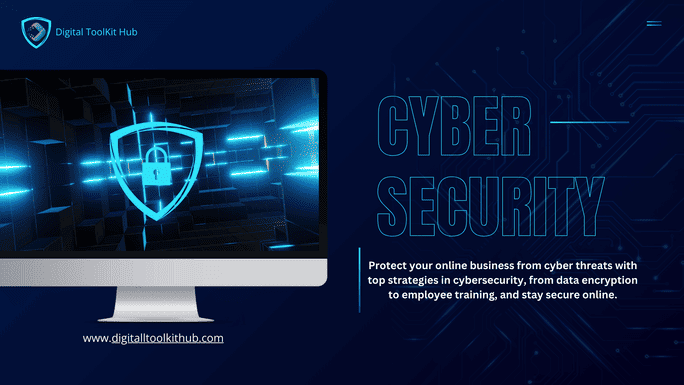
Best Practices for Securing Your Online Business from Cyber Threats
Created on 11 November, 2024 • Data Privacy & Digital Security for Online Businesses • 6 minutes read
Protect your online business from cyber threats with top strategies in cybersecurity, from data encryption to employee training, and stay secure online.
Protecting your online business from cyber threats is paramount. With increasing cyber-attacks targeting small and large businesses alike, implementing strong cybersecurity practices is essential for data protection, customer trust, and business continuity. This guide will cover best practices in online business security to help you safeguard your digital assets against cyber threats.
Understanding the Importance of Online Business Security
Running an online business opens doors to a global audience, but it also exposes your operations to cybersecurity risks. Cyber threats like hacking, data breaches, and malware attacks can lead to devastating consequences, from financial losses to damaged reputations. Here are some key reasons why robust online business security is critical:
- Protect Customer Data: Safeguarding customer information builds trust and prevents legal liabilities.
- Ensure Business Continuity: By preventing cyber-attacks, businesses can avoid costly downtime.
- Maintain Reputation: Customers value businesses that prioritize security, enhancing brand credibility.
Key Cybersecurity Threats Facing Online Businesses
To better protect your online business, it’s essential to understand common cybersecurity threats:
Phishing Attacks
Phishing is a common form of cyber-attack where attackers deceive employees into providing sensitive information. These attacks often appear as legitimate emails or messages from trusted sources, leading victims to click on malicious links or share login details.
Ransomware
Ransomware is a type of malware that encrypts your business data, demanding payment to regain access. Ransomware attacks can disrupt operations and incur hefty recovery costs.
Malware and Spyware
Malware and spyware are designed to infiltrate systems to steal data or monitor activities. They can enter systems through email attachments, infected websites, or unsecured software downloads.
SQL Injection Attacks
SQL injection attacks exploit vulnerabilities in your website’s database to access private information. These attacks can lead to the theft of sensitive data, including customer details and payment information.
Distributed Denial of Service (DDoS) Attacks
DDoS attacks overwhelm your website with traffic to make it inaccessible to legitimate users. This disruption affects customer trust and can lead to revenue loss.
Best Practices for Securing Your Online Business
Securing your online business involves proactive measures and regular updates. Here are some best practices to keep your operations secure:
Use Strong Passwords and Multi-Factor Authentication (MFA)
Encourage all employees to use complex passwords and implement MFA for all business accounts. Multi-factor authentication adds an extra layer of security, requiring users to provide multiple forms of identification.
Regularly Update Software and Systems
Outdated software often contains vulnerabilities that hackers can exploit. Keep all software, including plugins, operating systems, and applications, up-to-date to mitigate risks.
Encrypt Sensitive Data
Data encryption transforms sensitive information into code, making it unreadable to unauthorized users. Encrypting customer data, financial information, and other confidential data can prevent exposure in case of a data breach.
Conduct Regular Security Audits
Periodic security audits help identify vulnerabilities within your system. Security audits should include network, software, and physical security assessments to ensure all areas of your business are protected.
Educate and Train Employees on Cybersecurity
Employees are often the first line of defense against cyber threats. Conduct regular training sessions on recognizing phishing scams, handling sensitive data, and practicing safe browsing.
Additional Steps for Enhancing Business Cybersecurity
To further fortify your online business, consider adopting these advanced cybersecurity practices:
Use a Virtual Private Network (VPN)
A VPN encrypts your internet connection, protecting data as it travels across networks. This is particularly important when employees work remotely, as VPNs prevent eavesdropping on unsecured public Wi-Fi.
Monitor and Respond to Security Alerts
Use security software that provides real-time alerts for any unusual activity on your network. Respond promptly to alerts to minimize the impact of any potential breach.
Implement Role-Based Access Control (RBAC)
RBAC limits access to data and systems based on employee roles, ensuring that only authorized personnel can access sensitive information. This reduces the risk of insider threats and accidental data exposure.
Backup Data Regularly
Regular backups of all important data can be a lifesaver if your systems are compromised by ransomware or other cyber threats. Store backups off-site or in the cloud, and test them periodically to ensure they can be restored when needed.
Engage with a Cybersecurity Specialist
Consider consulting a cybersecurity professional for specialized advice. A cybersecurity specialist can help you set up advanced security protocols and provide insights tailored to your business needs.
Securing your online business from cyber threats is an ongoing commitment that requires vigilance, education, and proactive measures. By implementing these best practices, you can protect your data, build customer trust, and ensure your business operates smoothly in a digital world where cyber threats are ever-present. Prioritizing cybersecurity isn’t just an operational measure; it’s a fundamental part of fostering sustainable, long-term success in online business.